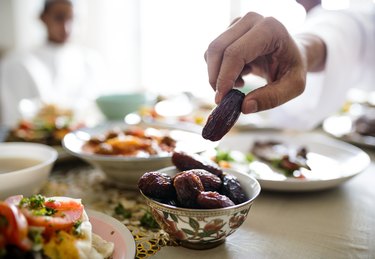
Only about 1.1 percent of the U.S. population is Muslim, according to a September 2021 Pew Research report. However, Muslims make up about a quarter (24 percent, to be precise) of the global population.
Muslims in the U.S. come from a variety of countries and backgrounds, so although Muslims follow similar dietary food laws, the cuisine itself is quite varied.
Video of the Day
Video of the Day
What Is Halal Food?
"Halal" is an Arabic word that translates to "permitted" or "lawful," according to the Islamic Food and Nutrition Council of America (IFANCA).
The term applies to all aspects of the faith, including business transactions and contracts, cosmetics, medication, as well as food and food preparation
But when talking about halal, most Muslims refer to meat and poultry, and if the animals are slaughtered according to Islamic dietary laws.
Halal slaughter is also known as Zabiha, per the IFANCA. Essential aspects of halal slaughtering include:
- The blessing of God, also known as the Tasmiyyah, which must be said upon each animal
- The religion of the person slaughtering (they can be Muslim, Christian or Jewish)
- The precise area of cutting
- The blade used (it must be sharp; can't be dull or blunt)
- The bleeding of the animal
The IFANCA states that in the United States and Canada, all Halal meat is required to meet all federal and state meat inspection laws before it is sold.
According to the American Halal Foundation, other halal food items include:
- All fruits, vegetables and grains, except those that cause intoxication
- All animal-derived products that come from Zabiha animals, such as beef, poultry and lamb
- Seafood
As long as the food item does not include a non-halal ingredient, it is considered halal.
Halal food cannot come into contact with other foods or packaging that is not considered halal. Cross-contamination is especially a concern when dining out as many restaurants prepare all food on the same surface or in the same oil. The food must be prepared, processed and packaged in accordance with the laws. If it's not, then the food is no longer halal.
Cheese (and other dairy products) must be made with halal microbial enzymes or bacterial cultures, and that includes the rennet or gelatin used in the manufacturing process, per the American Halal Foundation.
For non-meat items, Muslim consumers can read the ingredients and make a decision as halal certification is not widely available for packaged items.
Muslim Dietary Restrictions
According to Islamic dietary restrictions, non-halal items are known as "haram," which means "forbidden" in Arabic. These are the opposite of halal and include:
- Pork and all its byproducts, including gelatin
- Any animal that wasn't slaughtered according to Islamic guidelines
- Blood and its by-products
- Birds of prey (those with talons) and any other carnivorous animals, including reptiles and insects
- Alcoholic beverages and any other intoxicants
- Foods that include any of the items listed above
There are many organizations that offer halal certification, making it easier for Muslims to identify halal meat and poultry. Halal restaurants will also carry certifications for halal meat.
Muslims can generally read ingredient lists of packaged items to determine if it follows halal guidelines and if it is lawful for them to eat or drink. Food package labels that identify as halal, vegetarian or vegan are OK on a Muslim diet as long as there's no wine or other intoxicants.
Common ingredients that are not halal include gelatin, lard and alcohol. The challenge arises with enzymes and additives that may use non-halal ingredients but have not been clearly listed. In that case, you can contact food companies to find out more about the animal byproducts used.
The Muslim Diet
Muslims come from a wide variety of backgrounds and so their dietary patterns may look different based on family and cultural practices. Across the board, Muslims do not take in alcohol or pork in any form. If there is any doubt about the origin of an ingredient, it's avoided.
But, once a year, there is a significant change in how Muslims eat — and that's when they partake in fasting during the month of Ramadan.
All Muslims, except for pregnant and nursing people, children, older adults, and people living with chronic diseases and/or eating disorders are expected to fast from sunrise to sunset every day for the entire month. Over the course of this month, the Muslim family prepares a breakfast-like meal known as Suhoor before sunrise. At the end of the fasting day, they break their fast at sunset to eat their dinner, known as Iftar.
Although Muslims around the world follow Islamic dietary laws, the way they eat can vary significantly. Their diets typically include a variety of foods such as grains, legumes, meats, poultry, seafood, fruits, vegetables and more.
Tip
When in doubt, ask those who identify with the Muslim faith what dietary practices they follow.